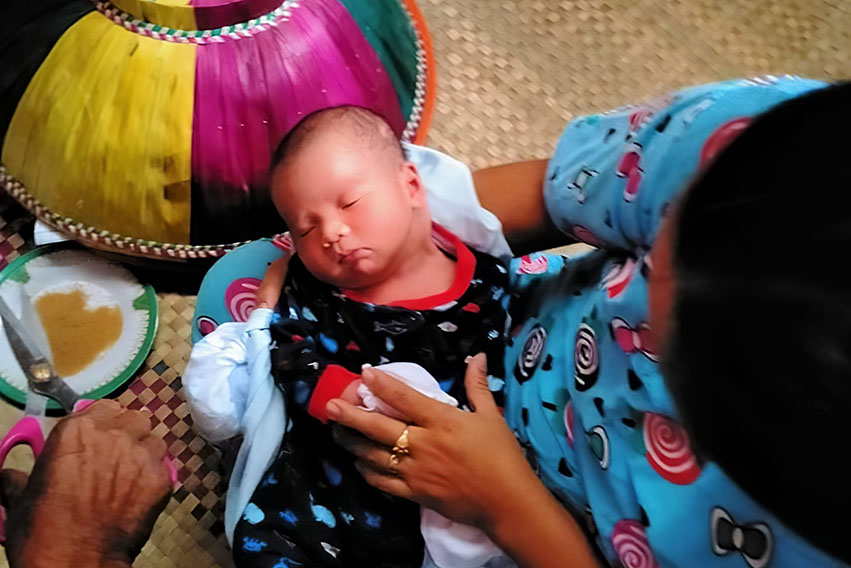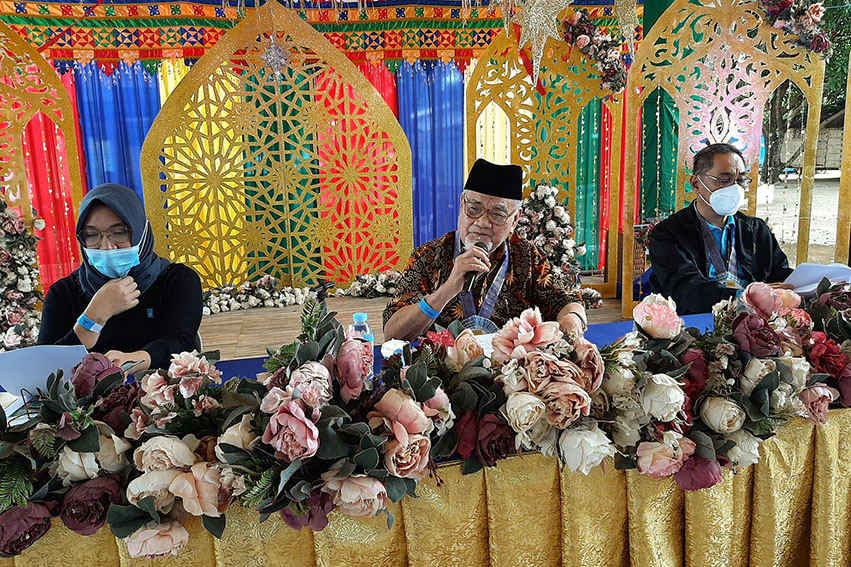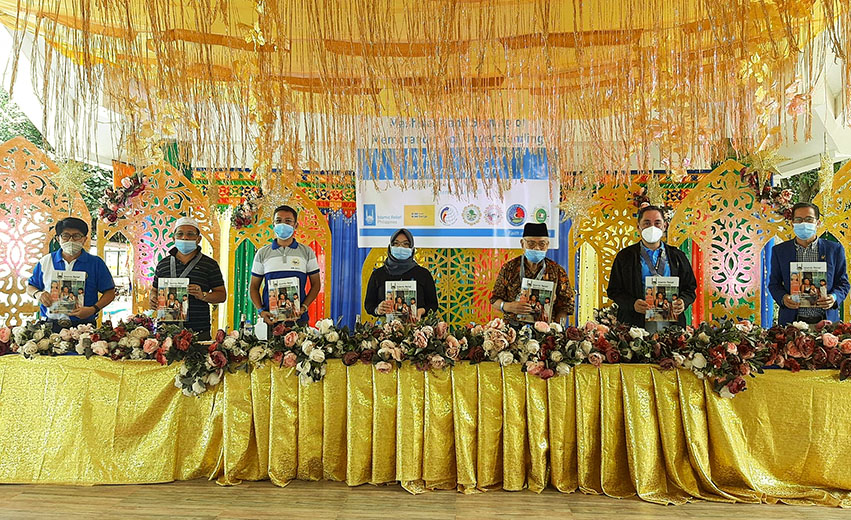DATU ODIN SINSUAT, Maguindanao (MindaNews / 16 Sep) – Gently, the imam cuts the thin hair of the new born, thanking Allah for the gift of life to baby Noore Yhahir Andik, 7 days old. For Muslims in the Philippines this religious ritual, akin to the Catholics’ practice of baptism, symbolizes the cleansing of the baby from impurities and the beginning of his life in the presence of Allah. The ritual is called “aqiqah,” an Arabic term for creed.
 Baby Noore Yhahir, 7 days old, is given the ritual of “aqiqah” on Wednesday (16 September 2020) in Pikit, North Cotabato. On the same day the BARMM Darul Ifta issued the Islamic Guidelines on the Issuance of Birth Certificate. MindaNews photo by JULES BENITEZ
Baby Noore Yhahir, 7 days old, is given the ritual of “aqiqah” on Wednesday (16 September 2020) in Pikit, North Cotabato. On the same day the BARMM Darul Ifta issued the Islamic Guidelines on the Issuance of Birth Certificate. MindaNews photo by JULES BENITEZ
The aqiqah ceremony is accompanied by the slaughtering of an animal as a sacrifice shared as food with relatives and neighbors. It is to be performed on the seventh day after the birth of the child. If the family is constrained to do so, they can do the ceremony on the 14th or the 21st day after birth. If still constrained, the ritual can be done any time before the puberty of the child.
As the imam and the parents give thanks to Allah, the child is named.
Low Birth Registration in BARMM
Baby Noore Yhahir is fortunate to be born to parents who are both educated, employed and appreciate the Islamic duty to give a child a name and the importance of acquiring birth certificate. However, for thousands of other children in the Bangsamoro Autonomous Region in Muslim Mindanao (BARMM), this is not the case.
In a 2017 study conducted by the Philippine Statistics Authority (PSA), funded by the World Bank, the BARMM was found to have only 37.9% level of birth registration. This is the lowest level in the entire country, the highest of which was observed in Region I at the rate of 99.2%.
BARMM PSA Regional Director Razulden Mangelen attributed this low level of birth registration to poverty, volatile peace and order situation, and low awareness and appreciation of the community to the importance of birth registration.
“This situation makes those without birth certificate and legal identity prone to injustice and place them at a disadvantaged position in terms of accessing basic social services from the government,” said Mangelen. He explained that without legal identification, individuals fall outside of the beneficiary target in the government’s delivery of basic services.
Those without identification may also encounter difficulties when IDs are asked in security checkpoints.
 Mufti Abuhuraira Abdulrahman Udasan (center), Executive Director of BARMM Darul Ifta, issued Islamic Guidance Number 20 during the launching of the So Ngala Ko, Kawagib Ko (My Name, My Right) campaign on Wednesday (16 September 2020). MindaNews photo by JULES BENITEZ
Mufti Abuhuraira Abdulrahman Udasan (center), Executive Director of BARMM Darul Ifta, issued Islamic Guidance Number 20 during the launching of the So Ngala Ko, Kawagib Ko (My Name, My Right) campaign on Wednesday (16 September 2020). MindaNews photo by JULES BENITEZ
Right to a Name Campaign, Launched
To address the challenge of birth registration, the Islamic Relief Worldwide-Philippines (IRW) entered into a Memorandum of Understanding with the BARMM Darul Ifta, the PSA and the municipal governments of Datu Saudi Ampatuan, Datu Hoffer and Datu Piang in Maguindanao on Wednesday (16 September 2020) to implement “So Ngala Ko, Kawagib Ko” (My name, My Right) campaign.
The campaign aims to help residents in the three municipalities acquire birth certificates and legal identification card through a campaign that is anchored on Islamic teaching, mobilization of community peace champions and collaboration with the local government units.
“We hope to model a community-based approach to birth registration,” said Sittie Najidah Montud, OIC Country Director of IRW-Philippines.
Montud explained that community peace champions, who were oriented and organized under a peacebuilding project funded by the Swedish International Development Cooperation Agency (SIDA), will be mobilized to promote the rights of the child to a name in 10 pilot communities in Maguindanao. Some 2,000 individuals are expected to be registered through this campaign.
“Through this MOU, the support of the municipal and barangay governments is assured,” Montud said. She noted that LGUs are expected to issue municipal and barangay resolutions in support of birth registration.
“The most important component of this campaign is the Islamic guideline issued by the Darul Ifta of BARMM,” Montud said.
BARMM Darul Ifta issues Islamic Guideline on Birth Registration
On the same date and occasion of the launching of the “So Ngala Ko, Kawagib Ko” campaign and the signing of the Memorandum of Understanding held at the Precious Cabana resort in the Municipality of Datu Odin Sinsuat on Wednesday, the BARMM Darul Ifta issued Islamic Guideline Number 20, “Issuance of Birth Certificate”.
Mufti Abuhuraira Abdulrahman Udasan, Executive Director of the BARMM Darul Ifta, signed and read the said guideline during the campaign launching.
 (L-R) Datu Hoffer Municipal Administrator Norodin Mamaluba, Datu Piang Municipal Councillor Macmod Tuan, Datu Saudi Amptuan Sangguaniang Bayan Secretary Matura Tapa, Islamic Relief Philippines OIC Country Director Sittie Najidah Montud, BARMM Darul Ifta Executive Director Mufti Abuhuraira Abdulrahman Udasan, PSA Regional Director Razulden Mangelen, and IRW-Philippine Programme Manager Christopher Estallo sign Memorandum of Understanding to Promote the Right of the Child to Birth Registration. MindaNews photo by JULES BENITEZ
(L-R) Datu Hoffer Municipal Administrator Norodin Mamaluba, Datu Piang Municipal Councillor Macmod Tuan, Datu Saudi Amptuan Sangguaniang Bayan Secretary Matura Tapa, Islamic Relief Philippines OIC Country Director Sittie Najidah Montud, BARMM Darul Ifta Executive Director Mufti Abuhuraira Abdulrahman Udasan, PSA Regional Director Razulden Mangelen, and IRW-Philippine Programme Manager Christopher Estallo sign Memorandum of Understanding to Promote the Right of the Child to Birth Registration. MindaNews photo by JULES BENITEZ
The guideline stressed, “Parents have to remember the importance of instant issuance of birth certificates for newly born children.” It added, “Islam, as Din (a socio-political system, a composite code, and a civilization), views it as direly needed and required for varied purposes and occasions.”
The guideline identified the need for birth certificates as follows: 1) Preservation of lineage and ancestry, 2) Acquisition of Education, 3) Travel and mobility, and 4) Legal contract, commercial transactions and social dealings.
It also explained the disadvantages of late issuance of birth certificate, as follows: 1) Identify falsification, 2) Difficulty in tracking medical history and medical management because of lack of medical records, 3) Lack of legal proof for claiming lost property and for seeking assistance in cases of migration or travel, and 4) Difficulty in giving proper funeral services in accordance with each religion in case of massive deaths as a consequence of natural calamities or tragedies.
The guideline concludes, “Parents are urged to immediately issue birth certificates for their newly born children to avoid forgery and misleading document for the affirmation of lineage and ancestry, as well as of affinity.” (Jules L. Benitez is the manager of IRW-Philippines Peacebuilding Project and is a contributor of MindaNews)
